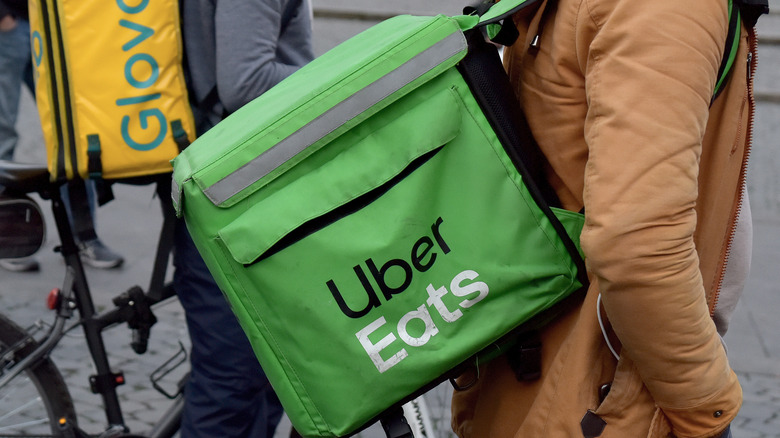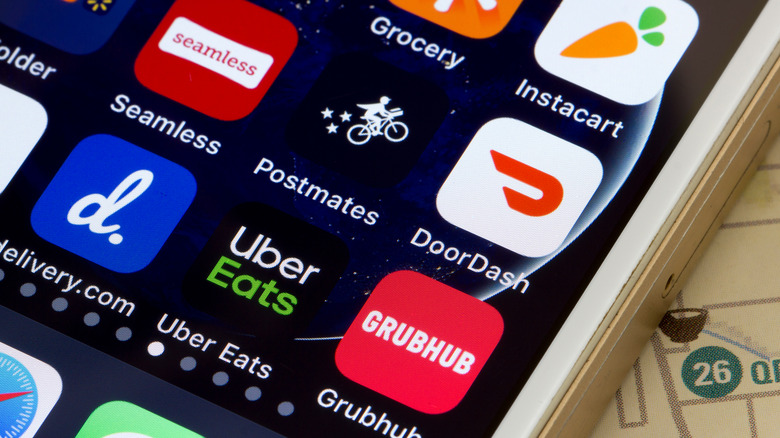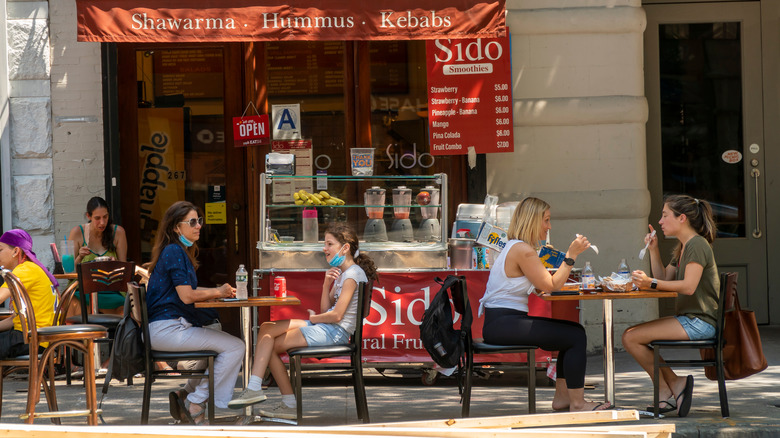Why DoorDash, Uber Eats, And Grubhub Just Filed A Lawsuit Against NYC
It didn't matter if you were an amazing home cook or one whose kitchen skills left much to be desired. Few of us will deny that food delivery services were our lifeline during the months shelter-in-place dominated our eating habits due to the coronavirus pandemic. Delivery services kept us fed and broke the monotony of having to eat our own cooking. In our minds, they represented the next best thing – if we couldn't go to our favorite restaurants, then they could come to us.
In the eyes of the New York City government, these delivery companies weren't heroes because for every order we put into DoorDash, Uber Eats, and GrubHub, delivery applies fees that amounted to as much as 30% off every bill (via Eater San Francisco). Citing the Wall Street Journal, Forbes reported that the city government passed legislation that limits commissions per order to between 15 to 23% of the delivery bill. It's also imposed a 5% limit to list and advertise a restaurant and a 3% limit to handle credit card fees. Furthermore, New York City Council wants food delivery companies to get renewable, two-year licenses to run their businesses in the city.
The caps themselves aren't new because the legislation follows on from temporary limits set during the pandemic. Similarly, San Francisco previously set a 15% cap during the pandemic and has already made it permanent. New York City is merely looking to do the same.
Food delivery companies call the ordinance 'unconstitutional'
Still, delivery companies are fighting back, and they're suing the New York City government because they say the caps are costing them "hundreds of millions of dollars" (via CBS News). Attorneys for DoorDash, GrubHub, and UberEats say the companies consider the new ordinance to be a display of government overreach. "The ordinance is unconstitutional because, among other things, it interferes with freely negotiated contracts between platforms and restaurants by changing and dictating the economic terms on which a dynamic industry operates," the lawsuit says. The companies also say that the ordinance "sets a dangerous precedent" (via The Wall Street Journal).
Local businesses don't seem to feel the same way. As New York City Hospitality Alliance executive director Andrew Rigie argued, "These first-in-the-nation bills are common sense and widely supported because they create a more equitable marketplace for local businesses and rein in certain billion-dollar corporations that have hurt New York City's restaurants and workers for too long" (via Restaurant Business). In a graphic example of how that commission impacts restaurant owners, one Chicago-based pizza outlet owner, Giuseppe Badalamenti showed The Washington Post receipts totaling $1,042.63 paid for 46 pizzas that had $666.09 in commissions earned by GrubHub. "It's like an open secret," according to Badalamenti. Ashamed of their situation, "owners have "been suffering in silence" because such arrangements have become the undesired norm for restaurants.
NYC council member Moya wants to protect mom-and-pop shops
City council member Francisco Moya said the bill, which he sponsored, had a purpose. "As we continue to tackle the rollercoaster that is COVID-19, our commitment to protect the restaurant industry and its workers remains steadfast. We are not here to enable billion-dollar companies and their investors to get richer at the expense of restaurants," he said (via New York City Council). Instead, the aim is to help mom-and-pop shops prosper by clamping down on onerous fees.
What happens in New York City might not stay in New York City. How the lawsuit plays out could ultimately have an impact on the way other big U.S. cities react to the delivery companies and the commissions they charge, especially because delivery food apps are everywhere in the country today. We can only assume other cities that have imposed temporary caps will be watching how things play out.


